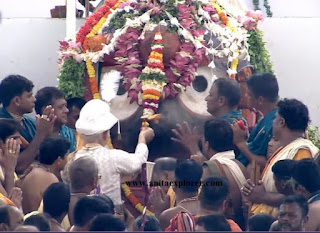Today, Deba Snana Purnima was observed at the Shree Jagannatha Temple, Puri, Odisha, and also in many Shree Jagannatha Temples in India and the world.
On Snana Purnima, Snana Yatra or Snana Jatra or Deba Snana Purnima rituals are held.
Gajanan Besha or Hati Besha is done.
It is celebrated on the Purnima tithi in the month of Jyestha.The bathing ceremony of the deities of the world-famous Puri temple is held and then they are dressed in elephant attire.
Snana Purnima is the day believed to be the tithi birthday of Shree Jagannatha.
Shree Jagannatha Mahaprabhu and His siblings- elder brother, Shree Balabhadra & sister, Devi Subhadra, are moved from their Ratnabedi, their usual place, to the Snanabedi or Snana mandap i.e. the bathing altar situated inside the temple premises where they take a ritualistic sacred bath using fragrant water from 108 pitchers as per tradition.
The deities take bath to get relief from the summer heat.
These centuries-old rituals show the leela of the “Lord of the Universe” where He performs various human activities everyday including brushing His teeth, bathing and eating the choicest dishes that are a part of Mahaprasad. Puri is the Bhoga Kshetra of the Lord.
The servitors decorate the deities with flowers and Tulasi (holy basil). King Gajapati Dibya Singh Deb, the first servitor of Lord Jagannath, visits the Snana mandap from his palace. He performs chhera pahanra (sweeping of the floor) at the mandap. He even offers deepa i.e. lit lamp (as shown in the image below).
There is a story behind Hati Besha. Shree Jagannatha had given darshan in this Besha to Ganapati Bhatt, a staunch devotee of Lord Ganesha. In the 15th century, Pandit Ganapati Bhatt of Mahaganapatya community had visited Puri to have darshan of Shree Jagannatha. However, he was dissatisfied as he did not find his God (Ganesha) within Shree Jagannatha. He had left the temple when a priest encountered him and asked him to revisit the temple to see what he wanted. It is said that Shree Jagannatha had disguised himself as a priest and asked the devotee to return the temple to see Lord Ganesha. That day was Snana Purnima. Ganapati Bhatt was overjoyed to witness Shree Jagannatha as Shree Ganesha on the Snana mandap. The deities had been dressed in elephant attire. The deities are being dressed in Gajanana Besha every year following the holy bath on Jyestha Purnima.
The Gods suffer from fever after the bath. After giving darshan as Hati Besha, as they become ill, they enter the anabasar house (anasara ghara) for treatment and are kept under rest and not disturbed by anyone. Only key sebakas, who provide medicines and aid their recuperation, are allowed access. During the fortnight, devotees are not allowed darshan of the Gods. Meanwhile, there is worship of Patti Dian. Chitrakaras paint the deities and the same Pattachitra is worshipped for the fortnight during which the deities are recuperating. After this time, when they fully recover, they set out for their annual journey- the Ratha Jatra. The siblings move in style in their grand chariots from the Shreemandira to their birthplace, the Shree Gundicha Temple. Today is observed as Jyestha Purnima. Jyestha means eldest. Some families observe festival/function to honour the eldest child of the family.
Images courtesy- Live telecast on Doordarshan Odia (DD Odia) TV Channel
Did you know of this sacred bathing ceremony of Shree Jagannatha and His siblings? Please share in the comments below.




Very interesting. Thanks for the detailed description.
ReplyDelete